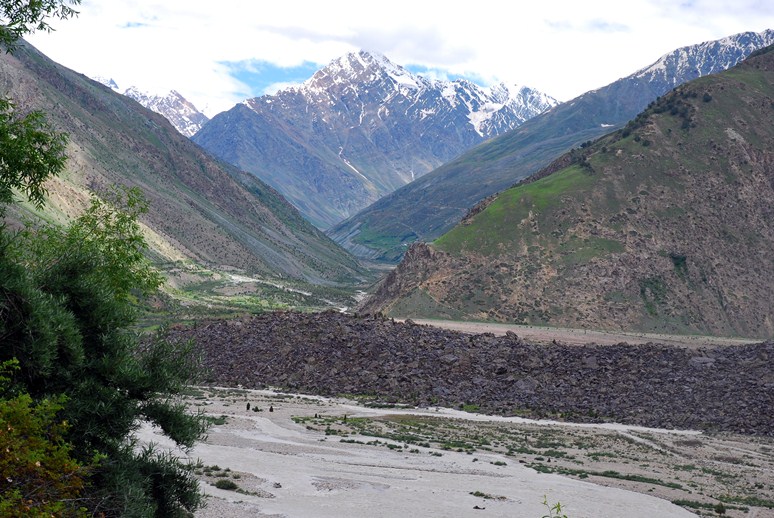
July 29, 2010
I practically fell out of the Tata in
sheer joy of being free of its horrors. The overnight ride from Leh
had been one of the worst experiences of my life. Packed inside a
swerving jeep on small, bumpy roads that more resembled a donkey
track than something fit for machine, the Manali – Leh highway
was a joke, a farce, a means to inflict maximum discomfort on people
who pay for the privilege. It would have been better to walk or take
a horse. Fortunately the scenery was immense. We had left the
barrenness of Ladakh for the greener pastures of Greater Himalaya. We
were no longer in the rainshadow of the mountains. We were in the
mountains themselves. Brian and I had amused the other passengers in
the Tata by
simultaneously vomiting on top of a 17,000 foot pass, more due to the
quality of the ride than to the thin air. Neither of us had slept and
neither of us had had anything to eat in nearly 24 hours. But here we
were in Darcha, a collection of tin shacks by a river, with soaring,
ice capped mountains overhead and, gasp, green things growing on the
hillsides. It was in the upper 90s, which was almost pleasant after
the frigid ride. The Tata raced
off for Manali and Brian and I settled into a tin shack selling
thukpa, a Tibetan
noodle soup with mutton that was one of our favorites. We ate our
fill and then retired to a patch of bare concrete in the shade to nap
and recover in. It had been a hard ride.

We found, much to our displeasure, upon waking, that the
Indian army had been busy blasting a road up the river valley we were
planning to hike up. Although the stated reason for building the road
had something to do with connecting an isolated region to the rest of
India, it seemed that all weather access to the Kashmir battleline
was a more realistic reason. As such, we walked out of town on a road
and caught a rickety bus to the end of the road in a nothing town
consisting of a few huts. We then walked the road, which was now
gravel. We would be road walking for quite some time.
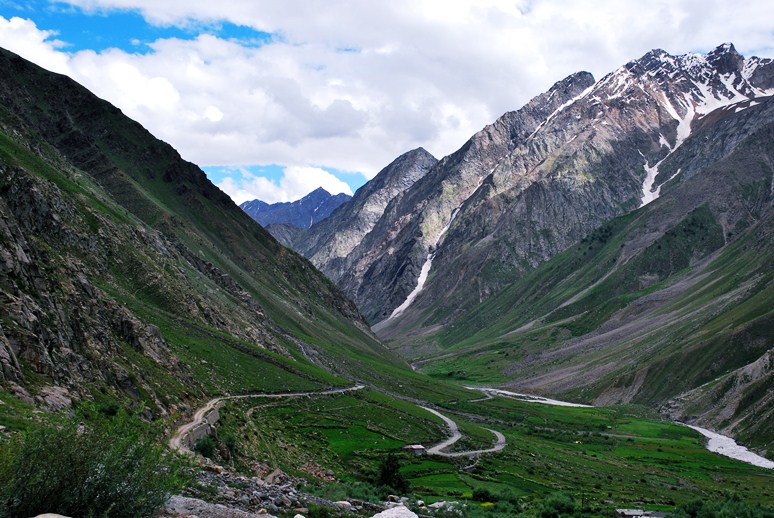
The valley itself was prefect. Or at least it was before the road was blasted in. Construction vehicles waddled past us. Workers hewed rock. There were a few mechanized implements, but the road was being built substantially by hand. The workers themselves were mainly Nepalese or from poor regions of northern India and they responded to namaste better than julet. We hiked up the road, following the raging river river than was 100% certain to flood and wipe out the road every few years, and ascended a valley so emblematic of the subalpine as to make even the most diehard Swiss or Frenchmen pine for the Alps. The valley was perfect. And the Indians were doing all they could to ruin it. We eventually set up camp in a field overlooking the river and started dinner. A group of three workers came over to see the strange people who carried things on their backs instead of with ponies and who were too poor to afford someone to cook for them. Indeed, one of their first questions was “Where are your horses?” We are our horses. This didn't go through so well. When we showed them our rice, lentils, and soya, they became more confused, for we were eating the same thing they were making back in their tents. Our tents, though, were much fancier. We exchanged what information we could and satisfied them that we were not actually insane. Just foolish. It was a good start to a long walk.
I slept deeply and long, tried from the worst experience of my life: The Tata ride from Leh to Darcha. Brian was tired as well, as I had to wake him from his tent after I finished my morning tea at 6:30. We didn't have a long day planned as our packs were heavy with food and we were still weak from the ride. A storm had come through during the night and the remnants of it were breaking apart on the mountains as we set off.

The valley was as beautiful in the morning, no, more so, than the
afternoon before. The cold, crisp air and a rejuvenated body
amplified the natural splendor that the Indian government was
systematically killing. Of course, the road would be wiped out by
avalanches and rock slides and shoddy work (maybe they shouldn't
build the road directly over creeks?), but fat European tourists
would still be able to take Tatas
along the road and feel tough about it. Locals could sell them
trinkets for a couple of months a year. There just wasn't much of a
reason to build the road, though as a social works project it might
have some value: It was putting hundreds of the most poor Indians and
Nepalese to work for just-over-starvation wages. But the road would
also destroy (has?) the trekking industry in the valley. But fat,
waddling Euro families would surely spend some money.
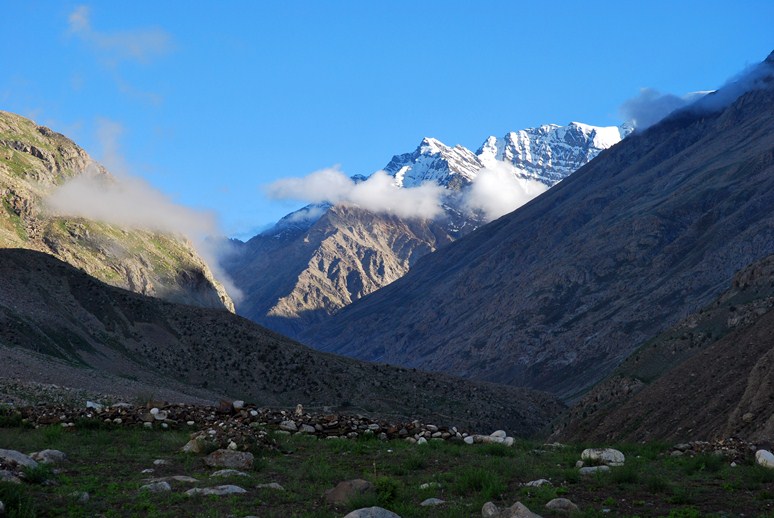
This is a central problem of tourism: To promote a place and
make it safe and easy for families, you normally end up destroying
that very place. Not completely, not entirely, but mostly. Ask Glen
Canyon. The Nepalese seemed to be doing it right, though this might
be due to lack of funds more than enlightened planning. Bhutan seemed
to be doing it right, though at the price of locking out all but the
wealthy. I suppose the middle class could look at photos of Bhutan in
a pretty picture book. Or on my website when I eventually save up the
cash to go there.
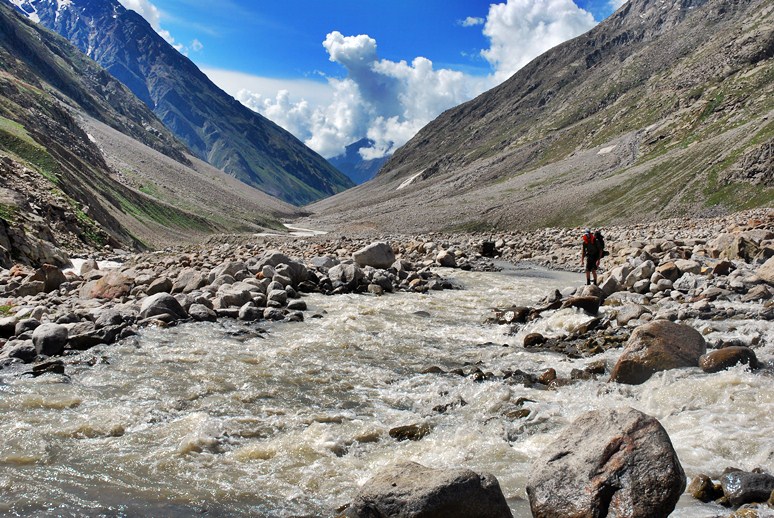
We followed the road grade along the river, laughing at
engineers who had designed a road that went within a thirty feet, and
only a few above, a massive, glacial river that clearly overflowed on
a yearly basis. Or when the road was built directly over a creeklet
with only minor attempts at drainage. The road would be the worst
kind of progress: It would kill the thing and not even work. The
notion that the road would some how open up the outside world to the
residents of the valley was just as laughable: There were a few
herder tents and one stone structure, located at the county seat of
Zanskar Sumdo. The Indian government couldn't even get phone service,
let alone radio phone service, into the valley. So how did they think
they'd get a road in there? We made a right turn and left the road
bed, heading up a side valley that marked the reach of the road.
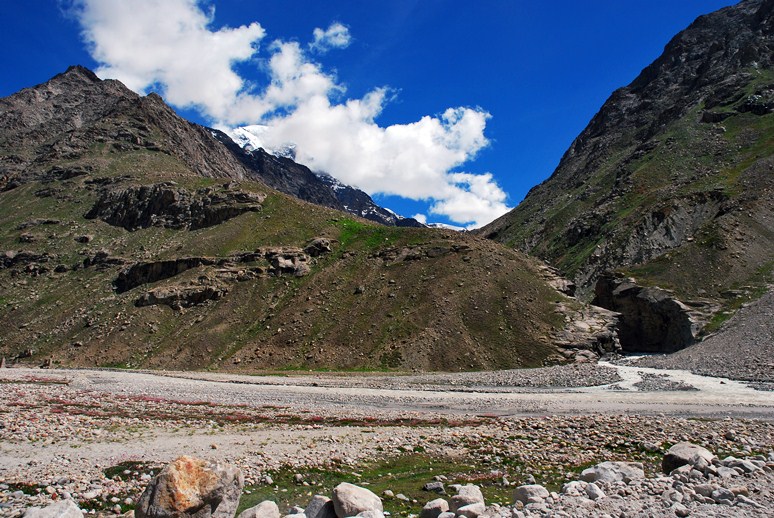
We reached the river and crossed on a substantial looking
suspension bridge. It was the most advanced example of Indian
engineering that I had seen since reaching the country, though I
suppose the open sewer in Leh was a close competitor. I was rapidly
loosing my vision of India as a future technological giant. The
bridge worked, but it would break or be swept away by the river in
another year or three, especially as it was used by stock animals who
were not strong enough to cross the raging torrent.
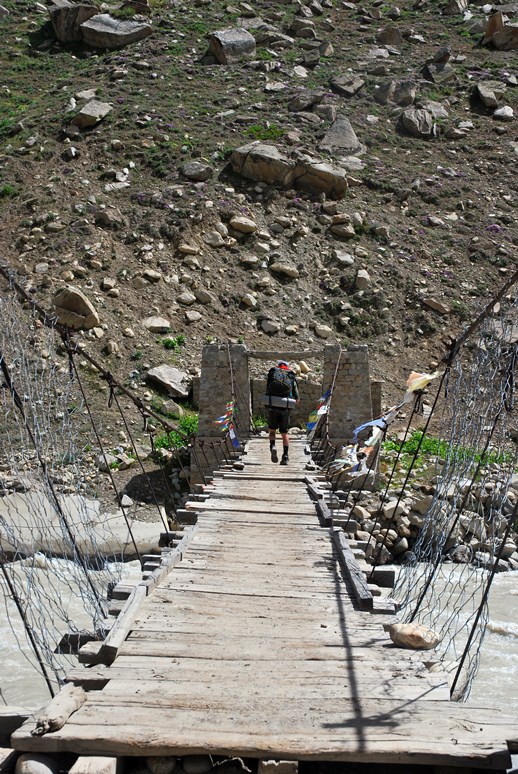
Above us we spotted a few very slow moving hikers with out
packs, along with multiple ponies and a guide. They quickly rose out
of site as we climbed the steep hillside. The view from the top was
sublime. Another perfect alpine valley stretched out for as far as
the eye could see, a pulsing whitewater river threading its way
through the rocky sides of the valley, dotted with green, and crowned
on the top of its granite, spikey walls with snow and ice.
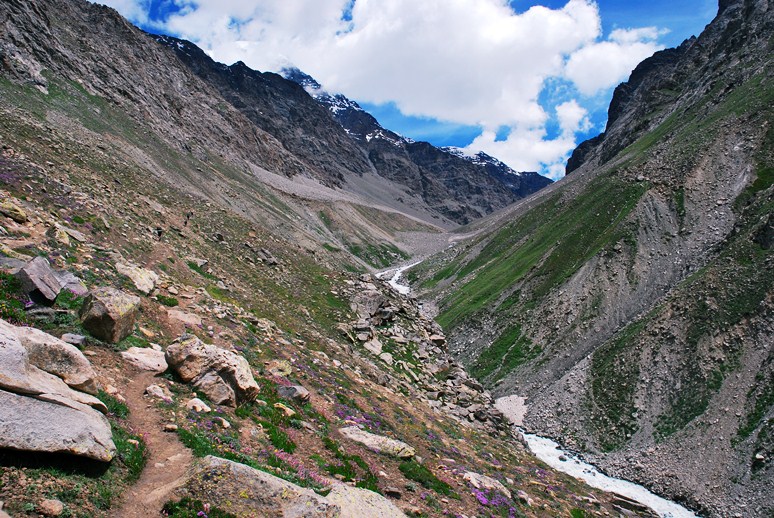
We met the four trekkers as they rested, winded by the
elevation. They were four Indian nationals out to see their country,
an activity that I wholeheartedly supported. We had met no Indians on
trek so far, either here or in the Markha. They were citizens of a
country with one of the most perfect scenescapes in the world, but
lacked the leisure time and resources to truly explore it. Indeed,
the four were from what we would call the professional classes: A
doctor, a banker, a lawyer, and an computer scientist. Their guide
was of Tibetan extraction rather than Kashmiri, a sign that they had
hired local. They, as most people had in the Markha, asked where our
guide and ponies were. We gave our usual response, which brought
forth laughter from them.
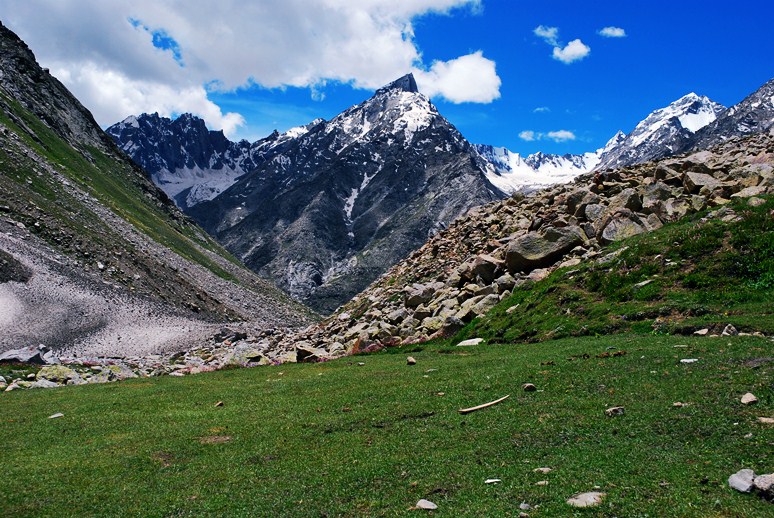
They were suffering from the thin air and, probably, a
lack of fitness brought on by the places where they lived: Delhi and
Chennai. I was sweating profusely while wearing as few clothes as
possible, while they were bundled up against the biting cold of the
85 degree air. As one of them said, they have three seasons in South
India: Hot, hotter, and hottest. It must be close to impossible to
exercise and keep in shape in such places. We hiked on alone until we
found the rubbish strewn campsite of Ramjak. We had been used to
seeing garbage in the backcountry of India, but this was really
pushing the limits of decency. Trash pits were dug for the cans and
bottles, plastic or aluminum, and biscuit wrappers and toilet paper.
The debris and detritus of trekking companies were omnipresent. It
wasn't the work of whitey, as whitey was in the care of the company
and the companies hadn't yet figured out that they could haul out
what they hauled in. We located a section of ground that required
only a small amount of trash removal to make livable and then settled
in for the night. It was 1:30 in the afternoon.
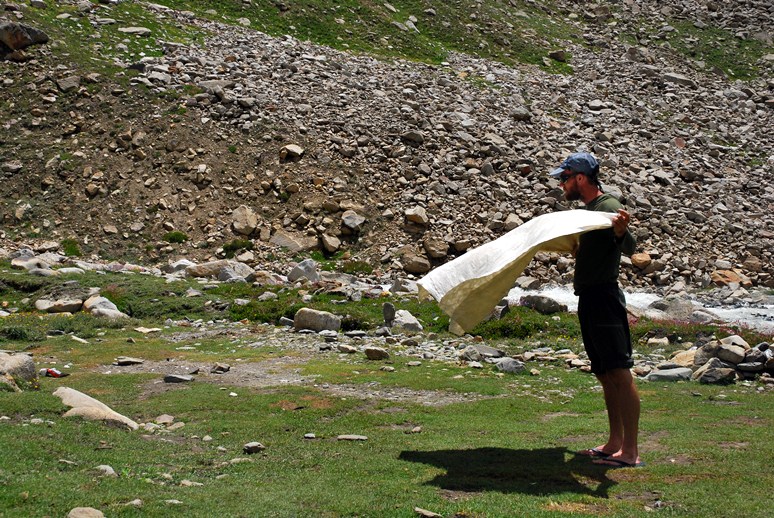
Tomorrow we face the Shingo La, the highest pass on the entire Zanskar traverse, and one known for its bad weather and constant snow and ice. Despite the presence of the road, the trek has been wonderful so far and I'm looking forward to the rest of it. As we progress along we'll come more and more into the rainshadow, which will cause the land to brown out and the green to fade to beige. I felt a vague sense of regret with deciding to start our trip in Ladakh as opposed to Manali and Himachal Pradesh. The more classic alpine scenery that we were experiencing here was much appreciated after the desert of Ladakh. And Manali had to be a better place to spend time than Leh. Even Gary, Indiana, is a better place to hang out.
I lounged in the warm sunshine and gazed off at the mountains in the distance and thought about my future,both the immediate Shingo La and the more distant, and in more ways the more substantial, future with Shauna back in Washington. I had plenty of ideas of how to spend the last month of my summer vacation, and all seemed equally pleasant. I had beginners mind toward the relationship, and that was why it was going to work. And work well.
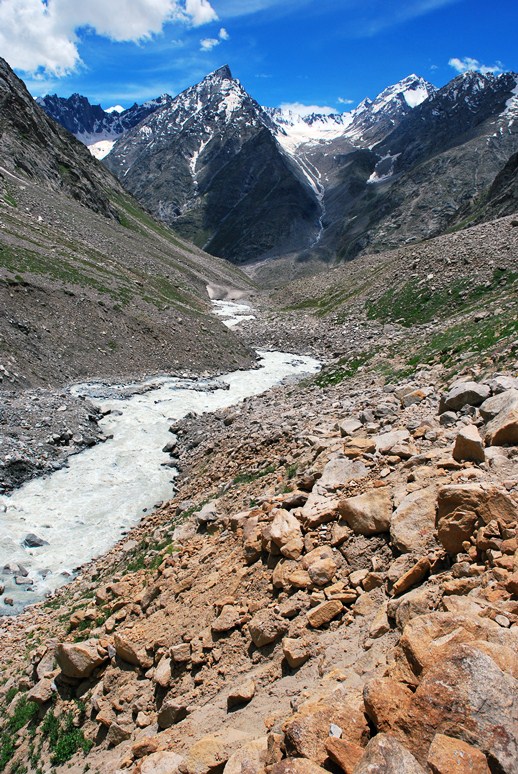
There were light, misty clouds when we left early in the morning.
Our Indian friends were still asleep as they were going to put in
another camp before going over the pass, a wise idea given the
elevation and the rapid pace at which they had reached Ramjak. The
valley seemed endless and no pass was in site, but that was not
necessarily a bad thing. My altimeter slowly ticked upward as we
crawled up and out of the subalpine and into the realm of the true
alpine. Pure rock, snow, and ice, with little alive.
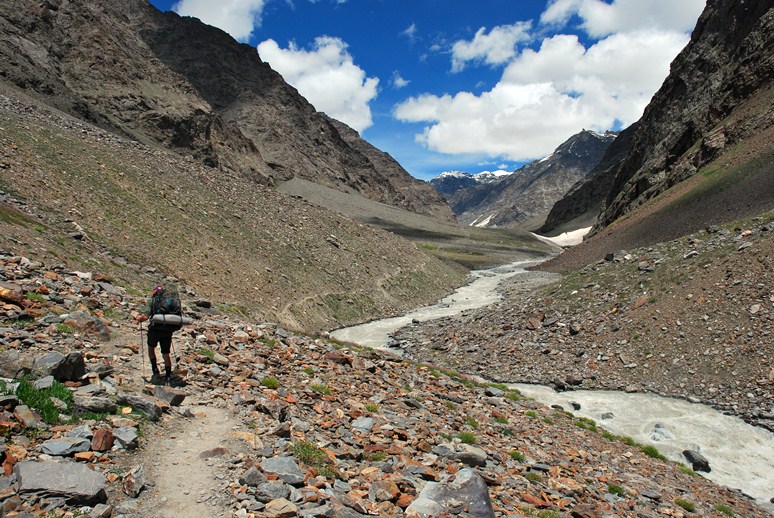
As we broke through the 15,000 foot mark and marched on toward
16,000 feet, I began to tire and labor. Brian outpaced me, reveling
in the thin air that was dragging me down. We met a few people coming
down who inquired where our ponies and guides were. Usual response.
We slowly gained ground on a Exodus pony
train, but for the most part we had the valley to ourselves. My pace
slowed and slowed until it was barely a mile per hour as I broke the
16,000 foot mark.
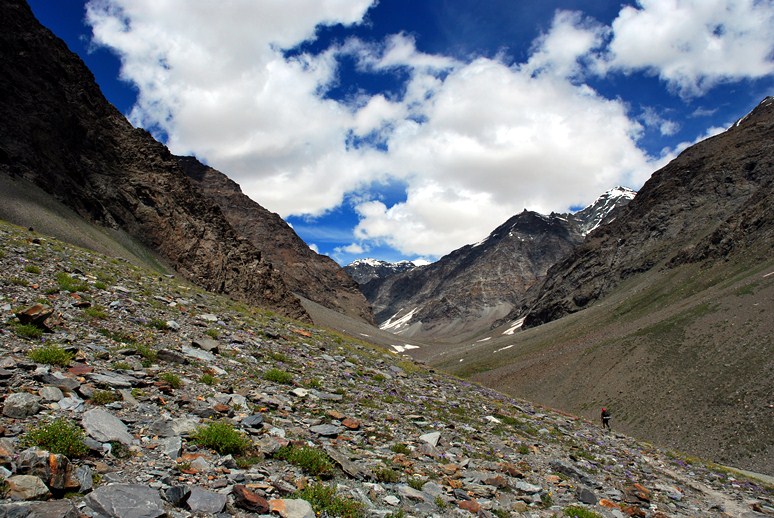
The valley was constantly surprising, with pockets of gorgeous
flowers carving out an existence for themselves in this hostile,
though dramatic, environment.
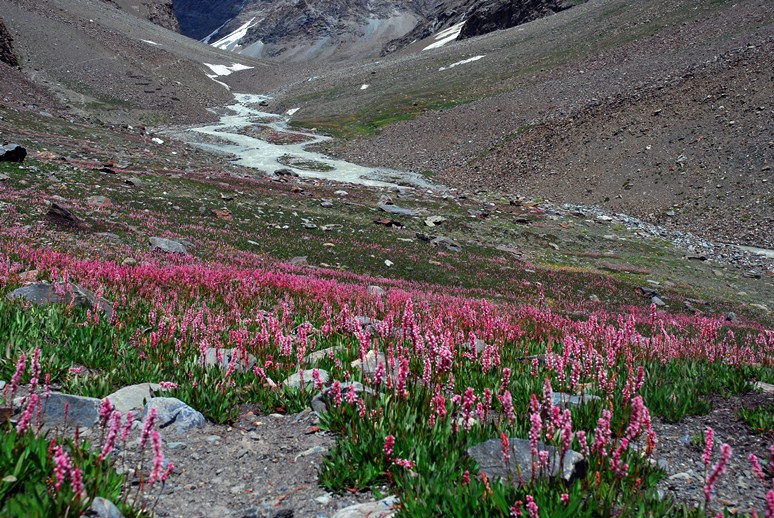
Brian and I regrouped and took a break as a group of Tibetans
came down from the pass, carrying a flag and as happy as could be.
They were clad in whatever clothes they had managed to scrounge up
and were heading for Darcha. Tonight. A reasonable, if long, goal. We
could see the pony train struggling up through the snow above us.
Brian and agreed to meet at the top, as I needed quite a bit more
time to make the pass than he did, and there was a cold wind blowing,
necessitating constant motion.
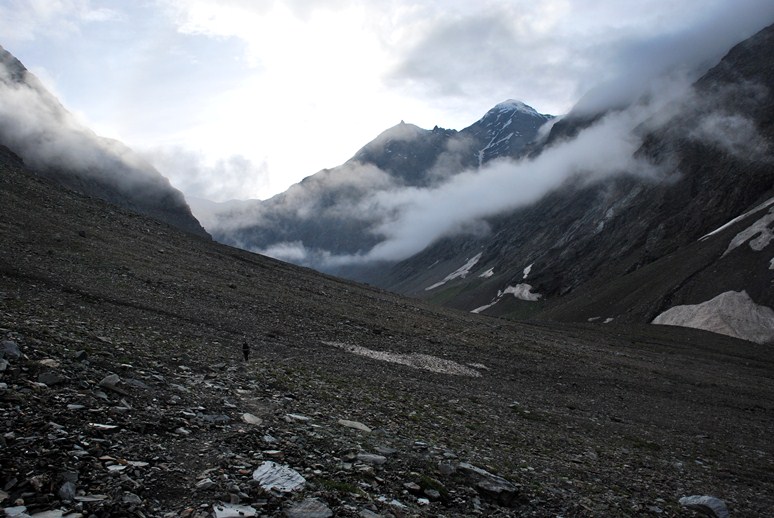
The purity of the alpine is not a reassuring quality. It
is a fearful one, one that does not invite a person to linger or
lounge. It is an abode that is best visited and not one to be
domesticated, the living room of everything that is not the village,
everything that is outside the bounds of settled, civil life.
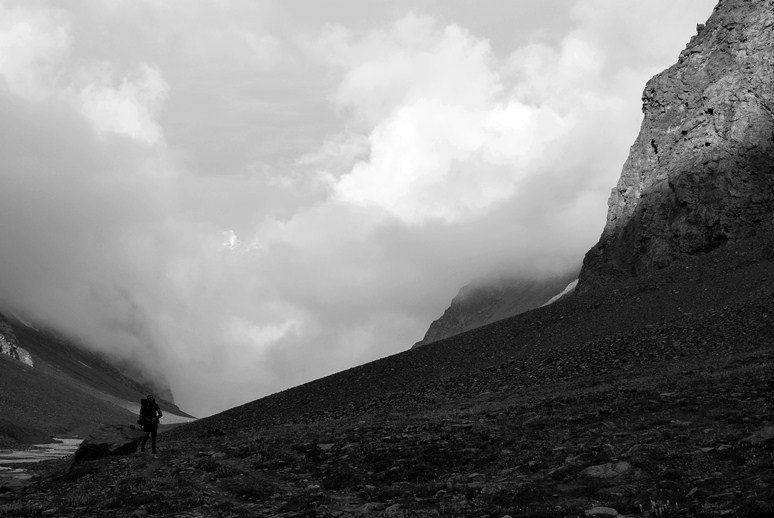
But it is a place that one calls to some of us, bringing
us to the hostile place to breathe the air and feel the sterility. It
is a place, like the floor of Death Valley or, presumably, the ice
floes of the Antarctic, that amplifies human existence. One does not
feel insignificant in such places. Rather, one feels a sense of
importance for no other reason that being alive.
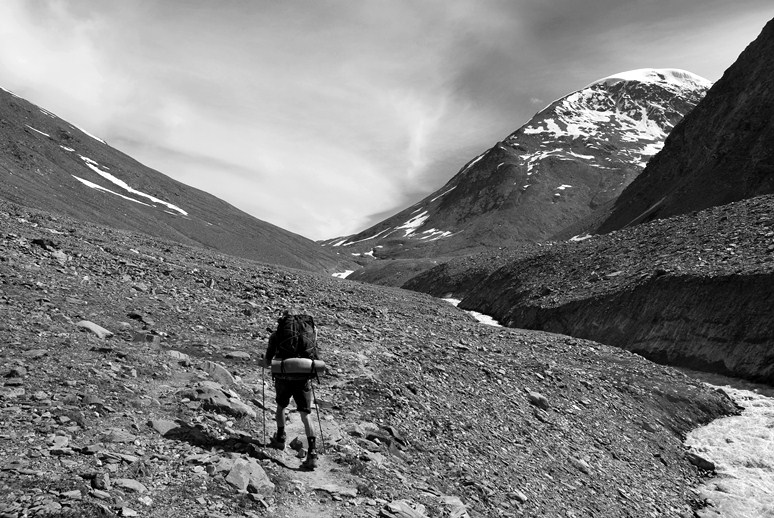
It is not an importance born and cultivated to be ego
satisfying or one that inspires arrogance. No, it is a sense that to
be alive is an important quality and that to be alive is better than
to be dead. Barren, lifeless places teach us this better than
anything written, drawn, or recorded. And, besides, the alpine is a
beautiful place to visit in fine weather.
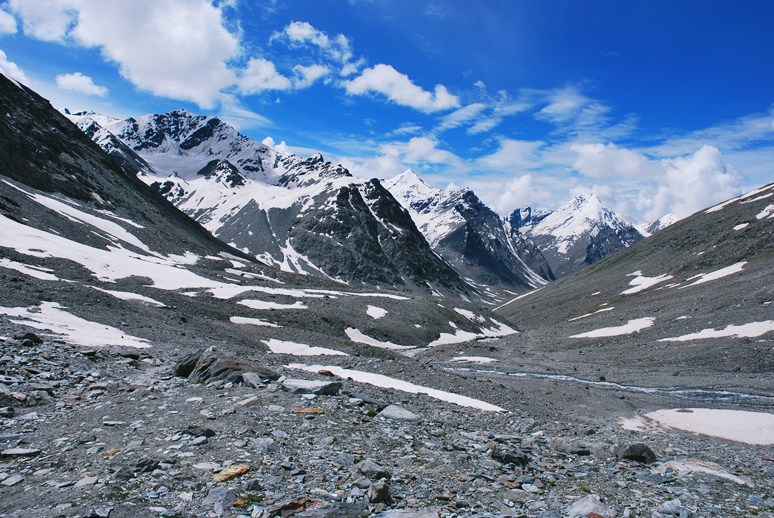
I was faced with a final steep climb, the one that I had seen
the pony train laboring on. And steep it was. Steep isn't good at
17,000 feet. But a slow pace can conquer much, just as water carves a
path through the hardest stone. I reached the top of what I had hoped
was the pass to find Brian sitting on a rock, grinning from ear to
ear. I wasn't the only one appreciating the land.

We were not at the pass, but rather at the far side of a snowy
plateau. Indeed, the pass was the plateau. After a brief rest and a
nugget of yak cheese we continued on through the snow and rock,
following the tracks in the snow, tracks made by very, very tired
ponies.
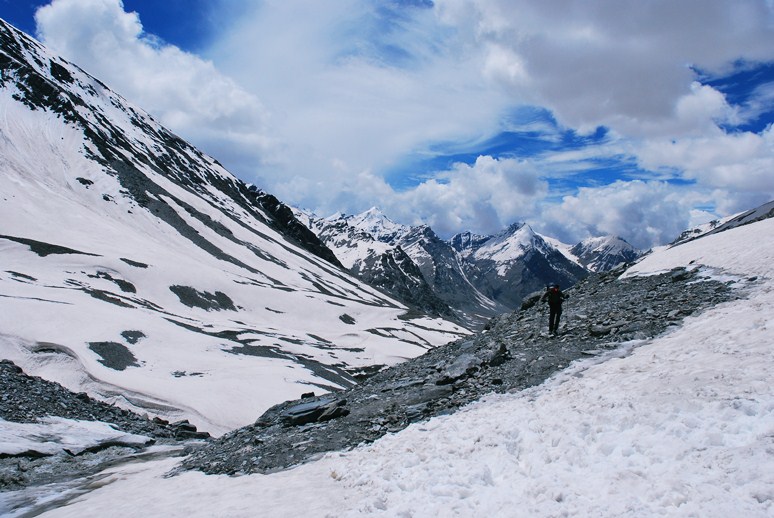
The pass was another 25 minutes away, festooned with
prayer flags and beneath many 20,000 foot mountains that seemed
impossibly close. The sun was shining and we managed to find a place
out of the wind to rest for awhile and appreciate the scenery.
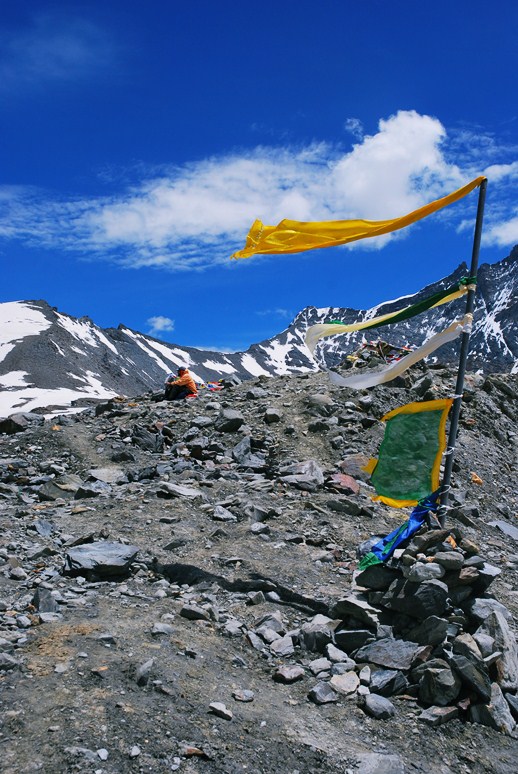
The pony train was here resting as well, though they moved
off the pass, struggling through the snow, within a few minutes of
our arrival. And then we had the place to our selves, to appreciate
and to gawk at. It was easy to be a fan of the Indian Himalaya on a
day such as this. We spent nearly ninety minutes sitting in the sun.
It was well worth it.
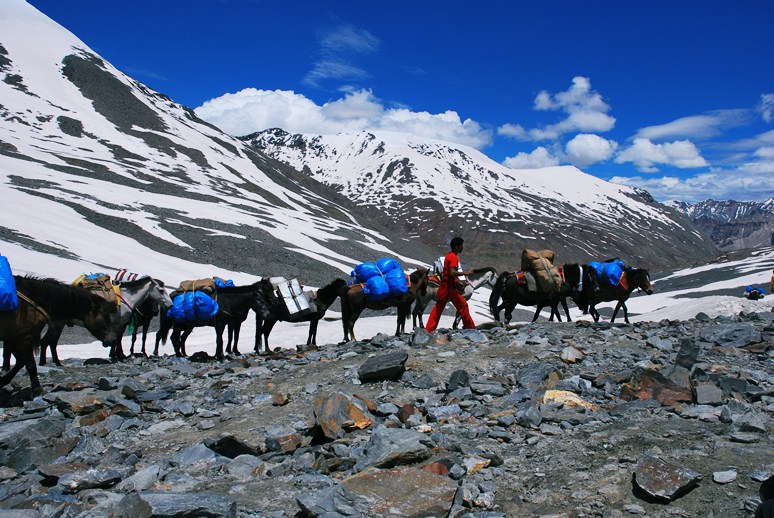
We followed the postholes left by the ponies in the snow down the
cold slopes and within a half an hour we were off the snow and
dropping rapidly from the lifeless alpine and into the increasingly
barren landscape. The Shingo La, it seemed, was the start of the
rainshadow.

After muddling around the lower slopes, the trail led out
to a huge U-shaped valley with a massive tower of rock in the
distance. Two rivers joined in near the base of the rock, forming the
settlement of Lakang Sumdo. I sat in the sun for a while to look on
it. Ant like dots were strung out along the trail, which I presumed
were the clients that belonged to the pony train we had been running
into all morning.
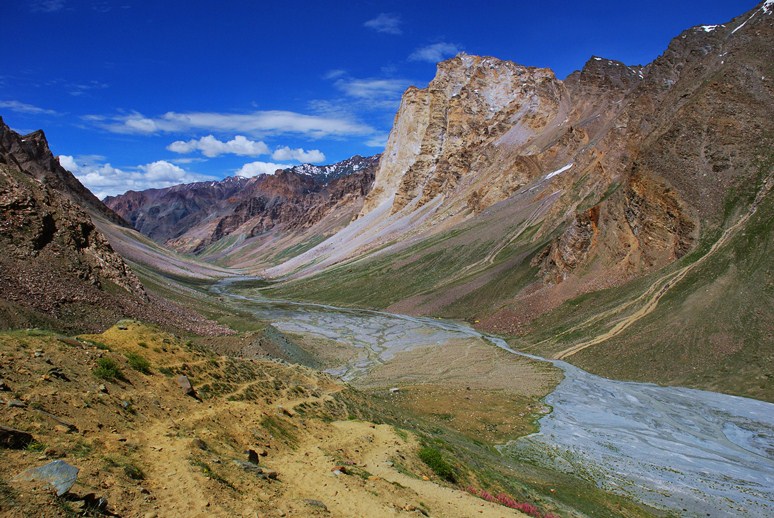
It took another two hours to hike down to that base of
rock, two hours which was filled with amazing views and lots and lots
of pink hikers, some bordering on the absurd. One woman was dressed
in full on traditional Swiss climbing gear, complete with elfin hat
and funny leather leggings. She carried a walking stick that, she
said, had been carved by local craftsmen. It looks like a stick
someone picked up by the side of a creek and stripped the bark off
of. She would have fit right in in a Ricola commercial.
As I descended, I came across a mime heading uphill. Not in black,
mind you, but a man completely frozen in mid step. Behind him was a
guide, also frozen. I paused for a moment and scrunched up my eyes at
them, wondering what they were doing. The guide eventually looked up
at me and smiled. I walked past. The man never flinched. He was,
apparently, too tired to move upward and too stupid to sit down and
rest. Brian and I reconnected at the base and wandered over to the
river to look for a spring, for the torrential river was flowing
quite brown, with plenty of sediment for our bowels. I've taken in
plenty of Colorado River water and have no desired to drink more of
it. We managed to follow some horses over to a flat, grassy area and
eventually located a spring, though one filled with algae. It took
only a moment to clear it and we had as much clean, cold water as we
wanted.
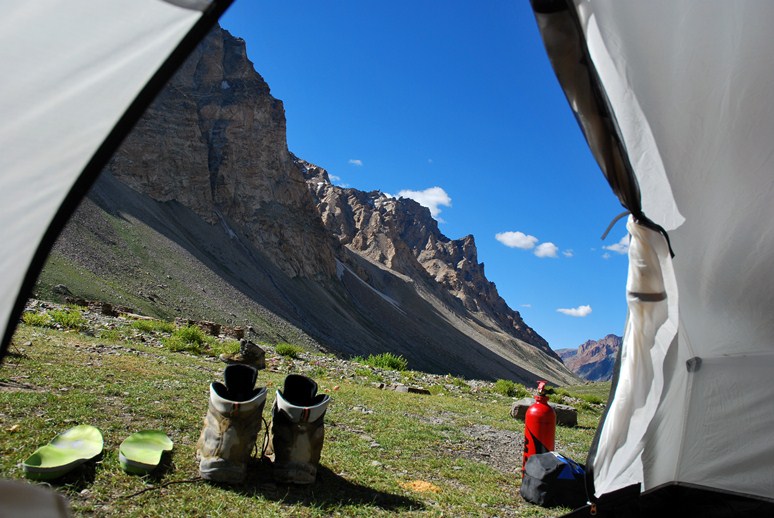
We set up camp and filtered water for our afternoon
activities, all the while trying to avoid the sun: My thermometer
read 107 in the shade of my vestibule. As we sat a Ladaki teen came
over to collect 100 Rs a piece for camping fees, which seemed
reasonable to us (about $2). However, he also wanted to collect 100
Rs for each tent we put up at Ramjak, which seemed rather far
fetched. He even had a receipt book for us. It might have been
perfectly legitimate, but paying to stay in a trash heap seemed to
add insult to injury. The Ladakis hadn't seemed to latch onto the
Nepalese method of extracting foreign currency from palefaces, which
is to actually offer something, like food or lodging, in exchange.
Rather than charging a small amount to camp, it would have been
better to charge a lot for meals and a bed. But that required
capital. Nepal is one of the poorest countries on earth, but they
manage to do it.
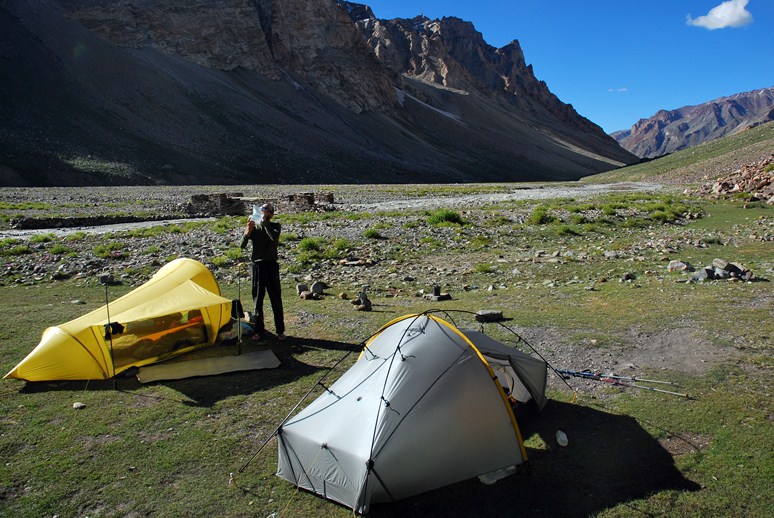
My body was feeling the difficulty of the trek over the Shingo
La. The altitude was hitting me a lot harder than Brian and I found
myself well behind him all day long. It wasn't fitness, as I had
completeld several 200+ mile, 24 hour bike rides earlier in the
spring and had been thumping along hiking before hand. The altitude,
though, was not an equal opportunity sapper. Tomorrow, though, should
be mostly downhill as we descend the valley toward Kargyak and, after
that, a detour to the famous cave monastery of Phuktal. As fabulous
as today was, the beating my body was taking was going to start
wearing on me eventually, and that would be a bad time indeed.
The blue skies and warm air of the previous day had vanished
with the setting sun and we were faced with low, overhanging clouds
and spittles of rain. It didn't matter much to me and I found that
the dour weather suited my mood just fine. It wasn't that I was sad,
but rather than I wanted to be contemplative for a while instead of
feeling like the prom queen. Shauna seemed to dominate every thought
and colored every image I came up with. This spilled over into a
conversation with Brian about perceptions and the role they play in
relationships with others, both positive ones and negative ones.
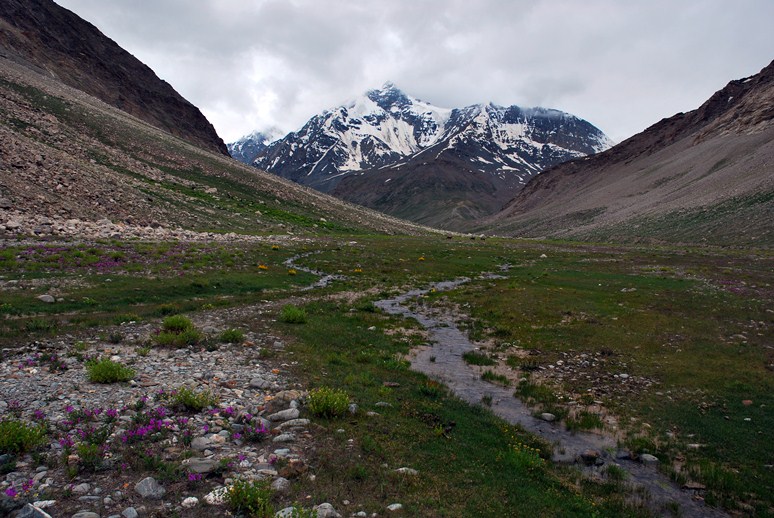
As we walked down we saw a man on the far side of the
river waving his arms above his head and shouting in Ladakhi at us.
We stood and pondered and walked some more. The man waved and shouted
some more. Eventually we were able to make out one word: Horse. We
looked around and found four horses wandering around on our side of
the river, apparently the man's. He wanted us, it seemed, to somehow
drive them across the river to him so he could avoid the ignominy of
walking a mile back up the valley to a bridge and then walk back to
the horses, who apparently had been ridden across the river by the
man the night before and then decided to re-cross without him. We
dropped our packs and tried to live up to our western histories as
cowpokes.
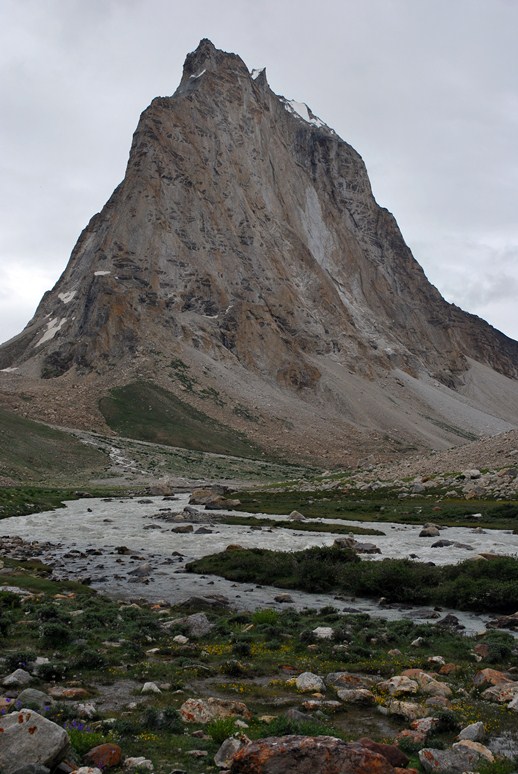
Herding horses that don't want to be herded is not an especially
easy task, especially by people who are not on horses, ATVs, and are
unfamiliar to the horses. We tried the encirclement method to trap
them against the river, but this was a terrible failure given that
the horses could just out trot us. After several mis-starts, I took
up the Ladakhi method of getting animals to do anything, which is to
throw rocks and shout. That actually did work and I started to get
positive results with well aimed rocks tossed in front of the animals
or behind them, depending on where I wanted them to go. The horses
lost their fear of being hit (the Ladakhis are not so shy about it),
and we lost them once again. After 30 minutes of herding, we gave up.
Even if we had managed to drive them to the water, there was little
chance we'd have been able to get them across the river as they were
not wearing a saddle and I wasn't about to try to push them across.
We waved at the man and returned to our packs.
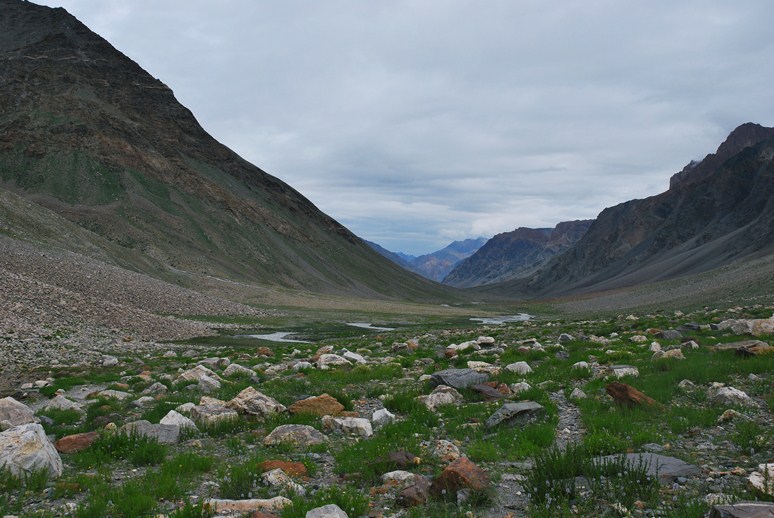
We returned to the trail and our conversation for a while,
but quickly broke into our own solitary thoughts. Thinking is like
that. It isn't a collaborative affair. It isn't something that is
done with others. After you've had your think, then you can share it
with others, learn from them, and modify your own thoughts. But the
start, the formation, and the thesis, have to be done alone if it is
to have any meaning. Shauna was on my mind, and I wanted to think
over her without anyone else around. It didn't seem like a long trek
to the village of Kargyak,
but time had passed and it was nearing 11 as we started breaching the
outskirts of the village.
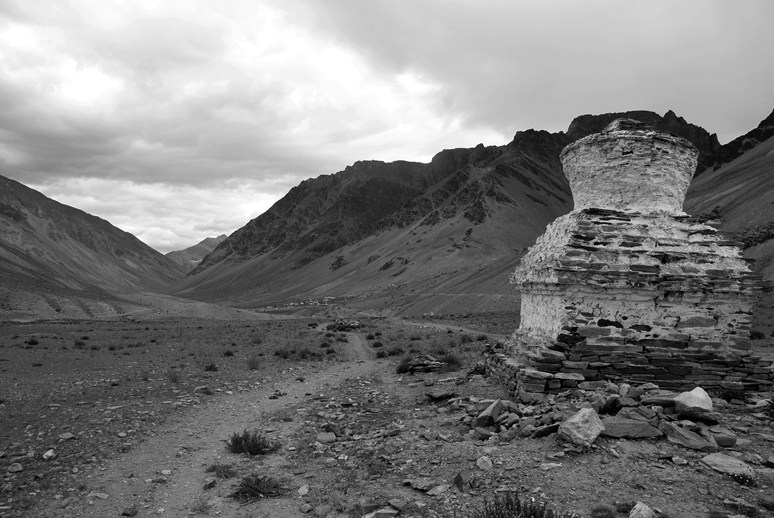
The massive valley meant that land was not at a premium in
the village and hence the sprawl. But the sprawl wasn't composed of
teriyaki joints, dry cleaners, and Starbucks,
but rather of religious monuments. It seemed like a good sprawl to
me.
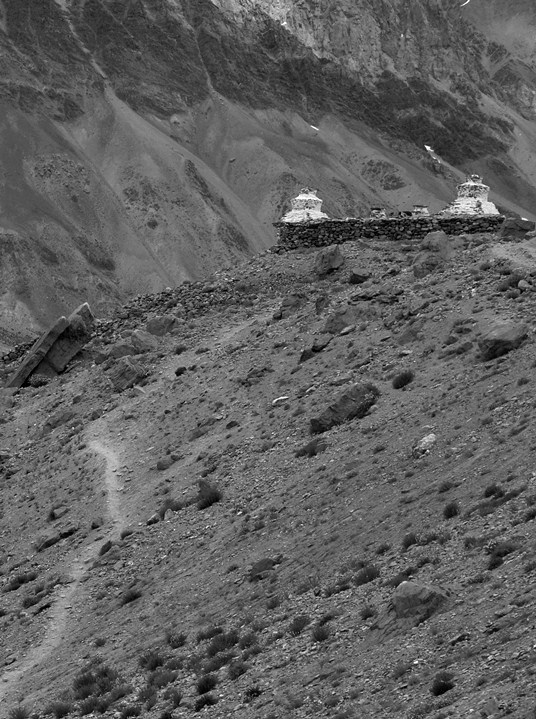
The village proper was quiet, with no one stirring. Except
for packs of kids who raced to us demanding balloons, pens, and
rupees. The adults were off working in the fields and nothing was
open, though we eventually found an old man who was working as a sort
of immigration agent and promised to round up the owner of the
parachute tent, who was apparently not working in the fields, but
sleeping somewhere. Brian handed out some balloons, but apparently
wanted money instead. None was forthcoming and then seemed to revert
to playing with the balloons Brian had given then. The children of
the village had been reduced to beggars already, the willing victims
of the trekkers who came through and didn't think about what they
were doing.
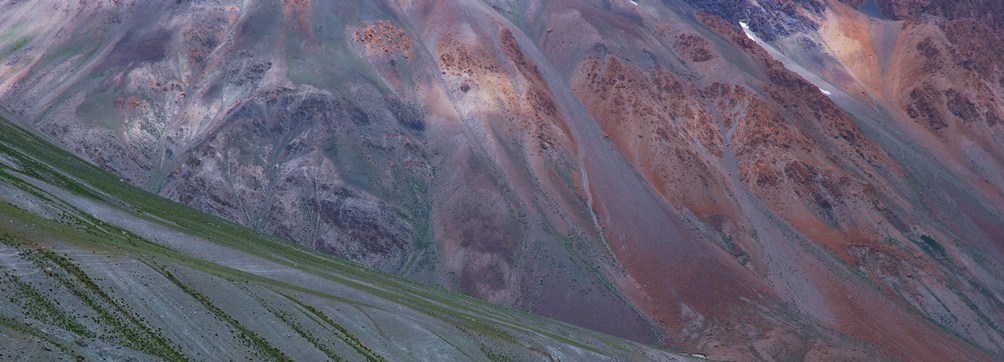
The parachute tent eventually opened and we settled in for
tea and noodles. It was also the headquarters for raising money for
the local school, which was being built according to plans donated by
some Czech architects and coordinated by a local woman, whom we also
met. This was the place for giving, not to the kids directly. The
kids would be quickly ruined with the continuance of the trekkers,
though maybe the soon-to-come road, if they could get it over the
Shingo La, would destroy the trekking industry and hence the begging.
We spent an hour in the tent drinking tea and talking in broken
English with the owner and various guides who came through. All, of
course, wanted to know where our ponies were. The large Exodus
group showed up, prompting us to
leave. The kids were clutching 10 and 20 rupee notes.
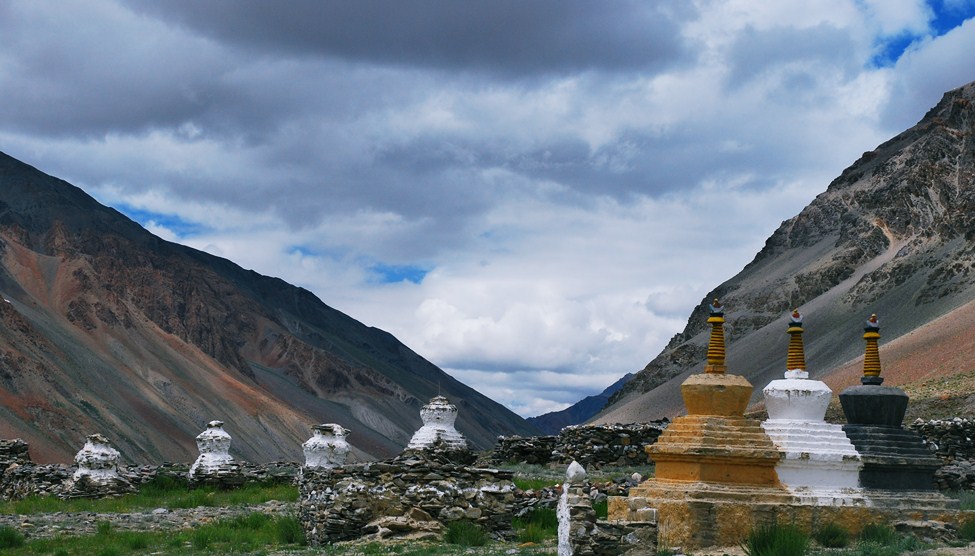
We left the main village with the intention of camping
nearby, but the village went on and on and on and the weather was
fine, causing us to walk on. I noticed a black shape nearby and
turned around to spot a black dog with a wolf-like look to him
slinking along behind us. This was how we met Wolf Dog.
At first it seemed that Wolf Dog just wanted something to eat,
another beggar from the prosperous village, he wouldn't come close
enough for us to feed him, not that we had any intention to do so. We
hiked on for an hour to a spring, which we rested at while filtering
water for the rest of the day and the upcoming night. We had finally
got beyond the village and camping options were numerous.
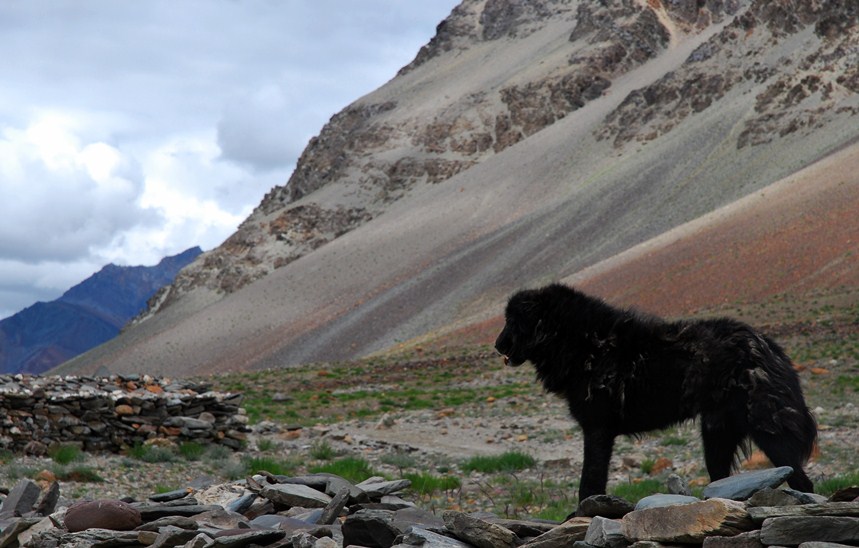
We eventually found a willow plantation along with well
constructed rock walls, behind which we could shelter from the wind,
for a campsite. The owner, we were sure, would be by eventually for
the 100 rupee camping fee. Across the river was another stunning
river valley running into the Kargyak. The map showed it running up
to glaciers and high alpine playgrounds. With more food, we could
have spent five days exploring. But there was none to be had. A lost
opportunity, magnified greatly since the valley got no space in
either of our guidebooks.
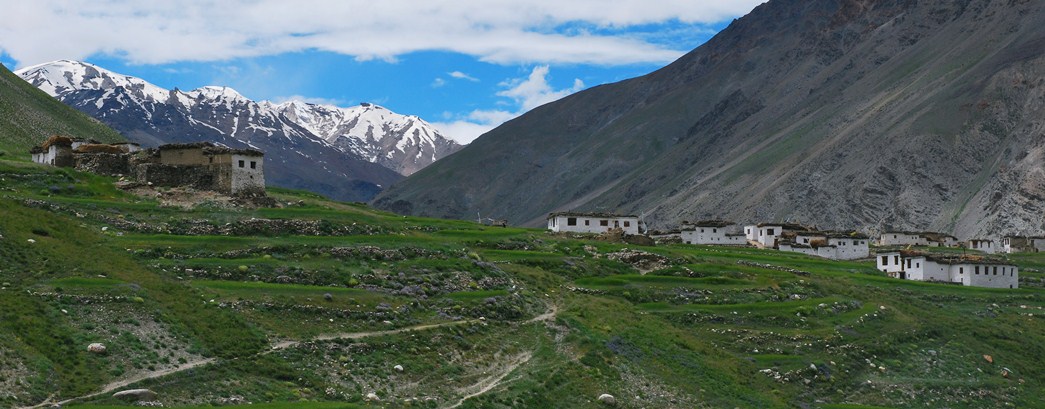
Brian and I passed the late afternoon in conversation, an
activity that we seem to due a lot of due to our short days and early
starts. The days are hot and the afternoons are not good for hiking
and by 2 PM we seem to be in camp or nearing it. Camp chores never
take long with us and there is only so much that I can write in my
journal. Hesse is wonderful,
but I was on a strict 20 page per day diet, lest I run out.

We spent the hot afternoon in the shade of the rock wall
talking, our only interruption being the visit from the two men who
seemed to own the plantation and wanted their 100 rupees, which we
eventually brought forth, though not until they explicitly asked for
it. Not out of any sense of meanness or being cheapskates, but rather
to step through the dance of finances in the developing world. It
didn't matter where we would have camped in the valley. Someone would
have found us and asked for money, claiming the land as their own.
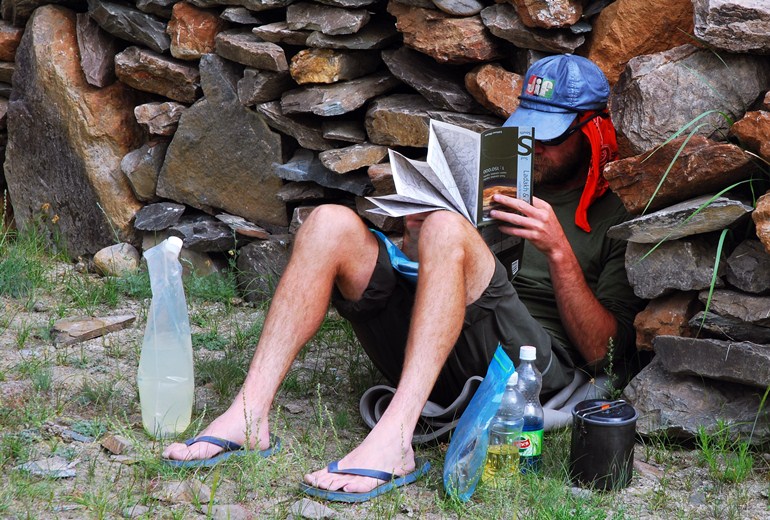
I spent an hour fiddling with the stove before I was able to
get it to run for the fifteen minutes we needed it for to make our
evening meal of rice, red lentils, dried onions, and soup packet
flavoring. We ate while watching the sun go down on the valley walls.
The day was working us over. Both Brian and I are used to hiking out
the day, to making the most of each span of daylight, not sitting
around by rock walls talking. There was a limit to our ability to
sustain this, as pleasurable as it was as a change of pace. The
altitude and my inability to truly adjust to it were limiting how
much we could do. We were descending in elevation and I was feeling
worse, which is not to be expected. Even walking on flat ground was
starting to bother me. Sitting didn't. And so we sat a lot and
talked. Hopefully tomorrow would go better. Hopefully. Tomorrow.
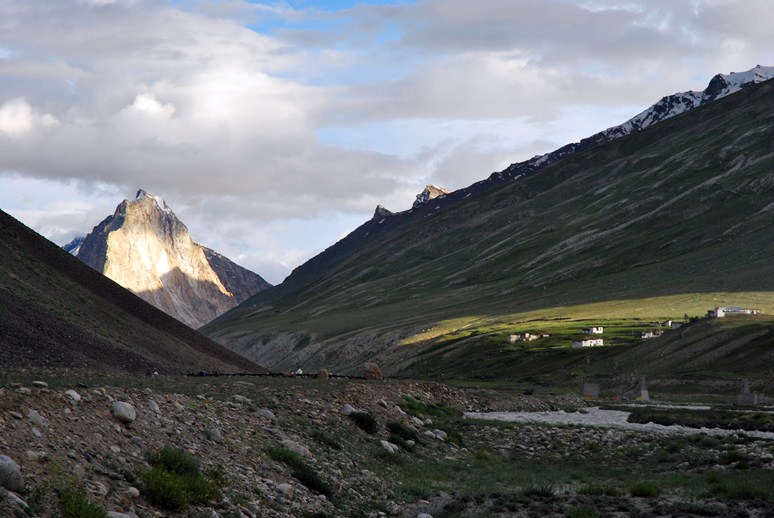
It just wasn't going to be a good day. The sun was shining, which
meant it would be hot. I hadn't slept well and the stove didn't work,
forcing me to fiddle with it for forty minutes in order to boil water
for tea. Even the sunshine on the mountain, looming on my front
porch, didn't do much for me. I was tired.
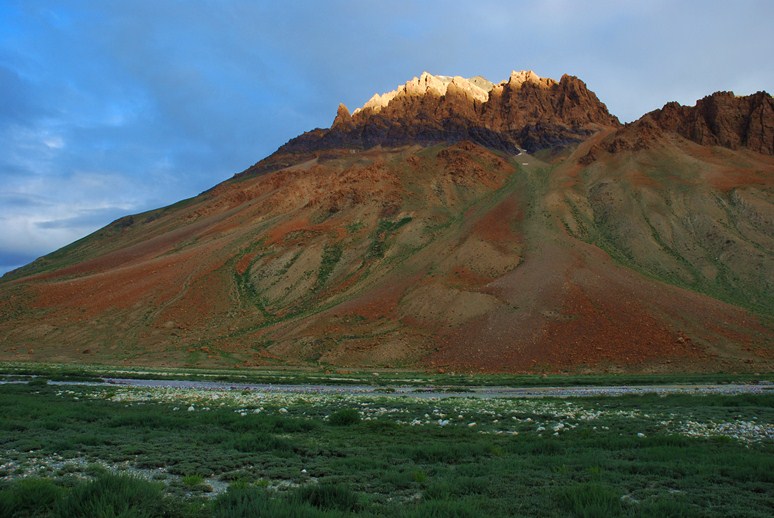
As usual we had the trails to ourselves at our early morning
start time of 6 am. The ponymen for the Exodus group were stirring,
though most were still sleeping. The big group had stopped at a river
confluence about a mile from where we had camped and were still
snoozing away. Their handlers were just beginning to get the fires
stoked for their breakfast.

The confluence of rivers was an important one, for up the
other canyon was a pass, and on the other side of that pass was
another, shorter, higher way into the region. Brian and I had
considered taking that route, primarily due to its being more
sporting and avoiding the road, but decided against it due to high
water concerns and snow issues. Judging by how much snow was on the
Shingo La, we had made the right decision. Several guides we had run
into yesterday confirmed our decision.
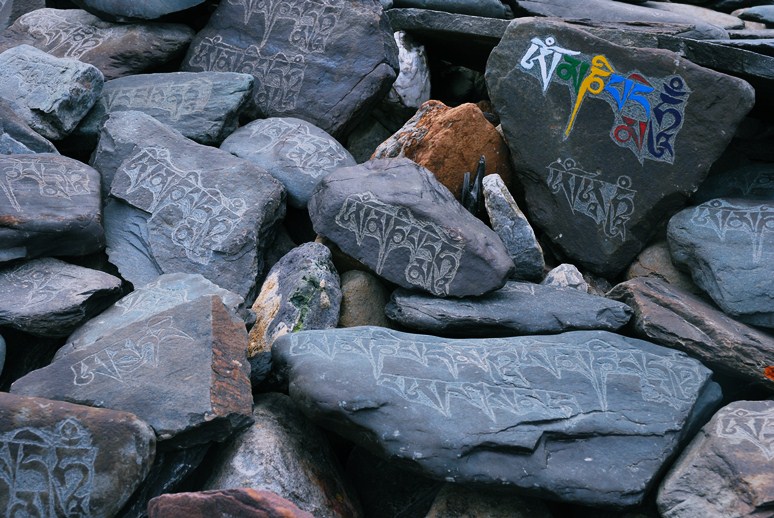
Our route took us past the Wolf Dog, across the river on a
bridge and then through a sequence of fords as we made our way up to
a small plateau that looked out above the river valley and the
settlement.
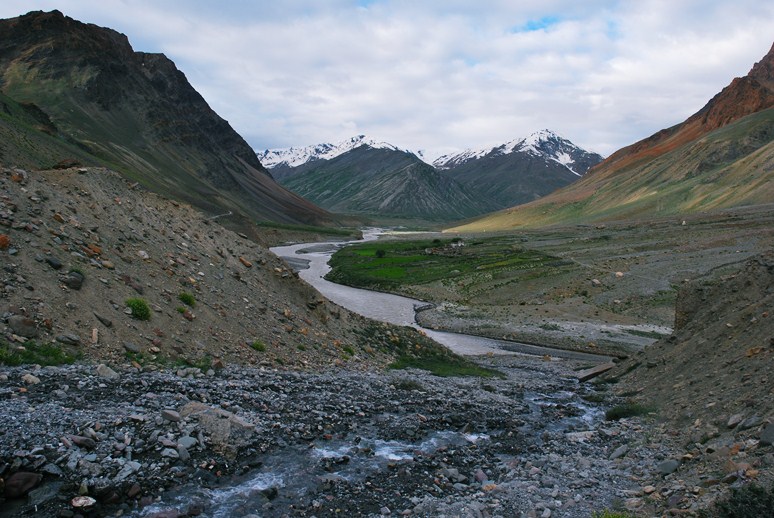
I began to tire almost immediately, only 90 minutes into
the day's hike. I felt like I had forty pound weights on my legs,
shackling then to the ground and keeping me from moving with anything
resembling ease or pleasure. I struggled forward, pushing myself
along the path for the only reason that there was no other way to
move forward, and we had to move forward.
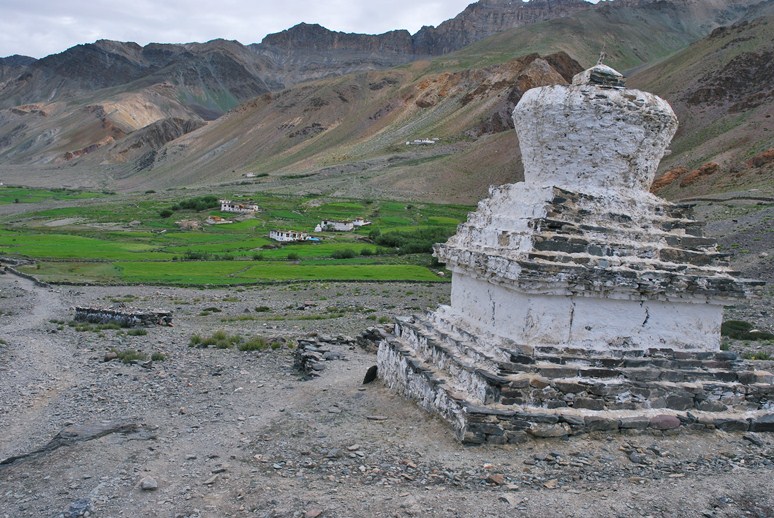
I was in a foul mood as we dropped to a river and then sharply
ascended to a prosperous looking village perched on a cliff side,
safe from the floods of the river below, and watered by cleverly
built irrigation ditches from minor, cascading streams. The adults in
the village were working in the fields and the children were out in
force. One, two, four of them pounced on us, asking for pens, money,
balloons. Brian wanted to please, but I couldn't stop. I kept moving
down the track. Brian was quickly surrounded by every kid in the
village. Eventually, as he later told me, he simply gave out his bag
of balloons and left. It wasn't enough for the kids and they tagged
after him, with more panhandling for rupees and pens.

The sun was out and it was hot. Despite the lower altitude
of about 13,250 feet, I was laboring even on the flat sections of
land. I stopped to drink water frequently. On any incline I had to
move at a snails pace with a distinct feeling that I was only using
one lung. Brian caught up and was worried, watching me stumble and
shuffle my way along. He offered to take my pack, but I didn't think
that it would help much and simply needed to get to Purne, where we
would be staying for the night. The heat and sun beat me, pounded me,
amplifying the suffering that was coming from my lack of energy. I
didn't know what was wrong with me, but it wasn't the altitude and it
wasn't a lack of fitness or an overly heavy load or an overworked
body. As I breathed, I simply wasn't processing the oxygen. The trail
dropped to the river several times and then climbed high one last
time.
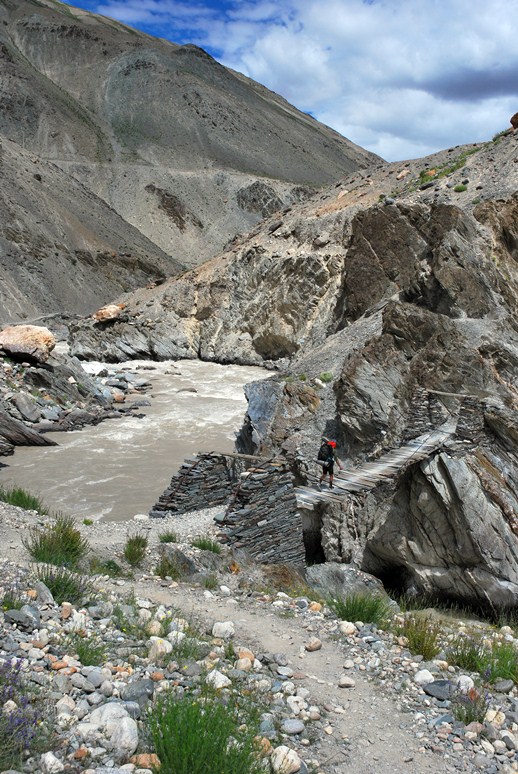
The descent into Purne was steep. Very steep. And hot and dry
and dusty. The worst was gazing at the steep, though shorter, ascent
on the other side of the river into Purne.
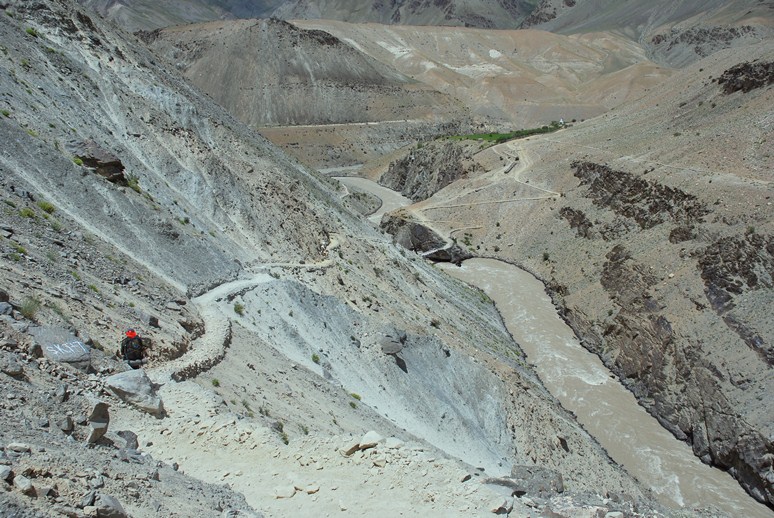
Purne was a village owned by two families who had set up shop
at the confluence of rivers, one of which led to the famous cave
monastery of Phuktal.
Everyone who comes to Ladakh has to go to Phuktal, an easy day trip
from Purne. The tourist part of the village consisted of several
stone and adobe buildings with willow roofs set in the middle of
green, grassy fields littered with tents. Brian and settled in under
the shade of a tarp porch, packless and happy. The sign told us we
were at Norbu's Guesthouse.
I would have been just as happy to be at the Palace Hotel. It was
only 1:30 in the afternoon, but it had been one of the worst hikes of
my life.
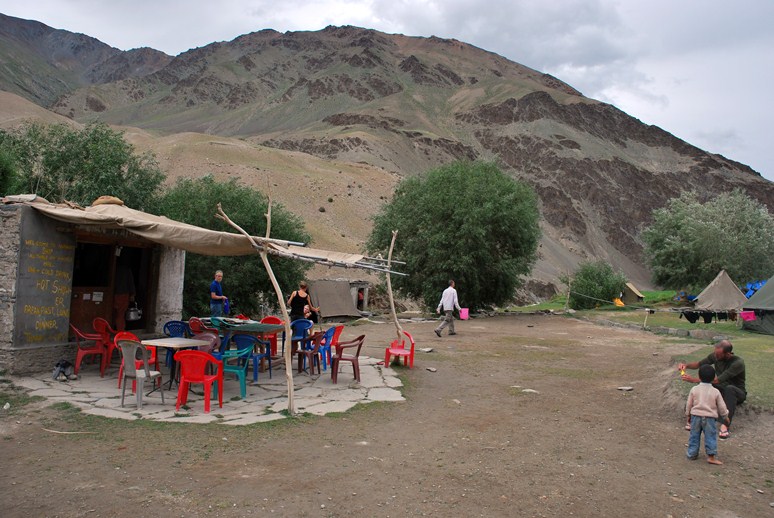
As I rested and drank tea and a soda*, I began to feel
better and the thoughts of ending the hike at Padum began to
disappear. We had a rest day tomorrow, with a pleasant hike to
Phuktal and a lot of gawking to do. Many trekkers began coming in,
though they were all in organized tour groups and hence stayed in
their groups. We had originally planned to camp, for 100 rupees each,
but when we found that a room was only 300 rupees, for both of us, we
decided to take the room instead. Wolf Dog came loping into town.
Brian entertained the village kids with balloons. They hadn't begged,
they hadn't panhandled. They were regular kids. Locals and guides
came and went and we found ourselves having more to talk about with
them than with the Euros who floated through in tour groups. A few
braves came over to chat, but we mostly spoke in broken English with
the Tibetan stock women who ran the place. Rigzen was
a fine woman, but oddly enough not married and without children at
the rather old age of perhaps 25. She made us a large dinner of
yellow rice with local greens, topped with two fried eggs. Much
better than our usual fare.
As the sun began to drop a group of three Kashmiri stock men came riding into town on ponies. Clearly important men, these highrollers instantly commanded attention from the locals, who scurried and hurried to fetch things for them. They took a room near ours and had hot water brought for washing. A kid goat was slaughtered behind one of the buildings, a rather unusual occurrence in a Buddhist village. I watched the cleaning with minor interest after watching my uncle do the same to a wild boar we had hunted earlier in the summer. I wasn't sure who the highrollers were, but the villagers of Purne were clearly out to make a good impression. The smell of the curried goat brought forth hunger once again. I retired to the room instead of staying to see the feast come out. Shauna had been in my mind all day and seemed so far away. With the difficulty of today, all I wanted to do was to return home and be with her, rather than slogging along desert trails in high heat while trying to operate on a single lung. As I lay on the bed in the dark I thought about her and our life together when I got back to the States. It was a comforting thought, but an agonizing one at the same time. Thunder rolled outside.
The rain and thunder went on all night and into the morning, turning the front yard of the guesthouse into a mud pit. Brian was already up and about when I made my way over to the shelter of the kitchen and found a chair waiting for me. Rigzen brought a large thermos of milk tea over for Brian and I. I think she liked us because we played with the kids and talked with the people who lived in Purne as opposed to staying with people who's skin tone was the same as ours. The rain continued down, heavy at times, and pounded on the Exodus group, who were intent on keeping to their schedule and were thus packing up for the hike to Phuktal. Brian and I drained 15 cups of milk tea and asked for another thermos. Rigzen smiled, though more at Brian, I think, than me. The highrollers came out as well and had western boxed cereal. Brian and I ate chapatis with fried egg. The humor of this was not lost on either party. An hour after the Exodus group left the sun came out and we set off for the monastery as well.
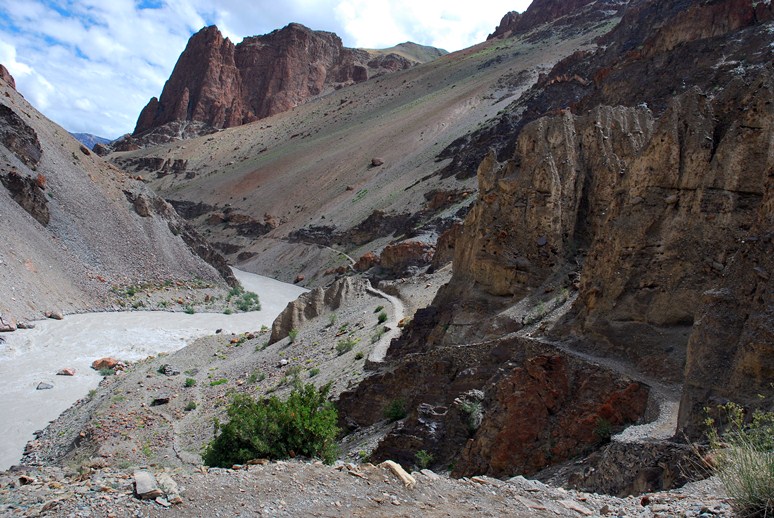
It felt great to be walking without the pack, high above a
brown, murky river with steep canyon walls and blue skies overhead.
The trail itself was Grand Canyon-esque, writhing and twising and
following the complicated walls, occasionally diving to the water and
then climbing steeply back up. My body felt much better than the
previous days, though it was only a 75 minute hike to Phuktal.
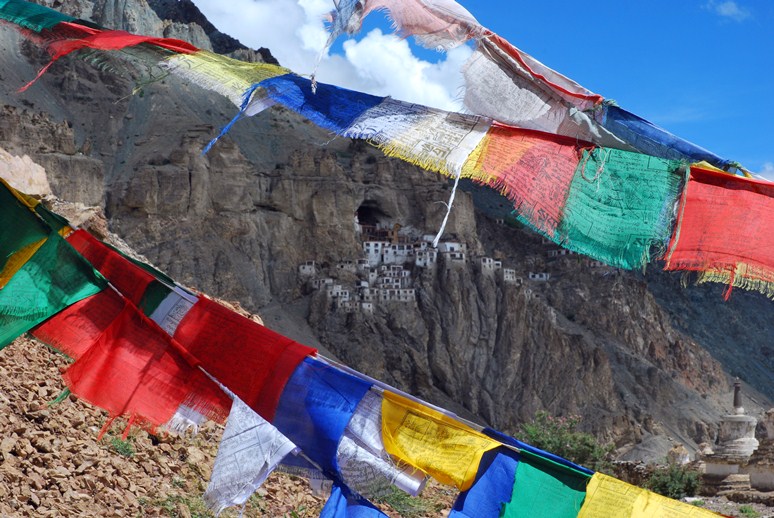
As advertised, Phuktal was built, carved is a better word,
directly into the wall of the canyon, commanding a powerful view of
the river and a surrounding village that had sprung up some time
after the establishment of the monastery. Many centuries ago monk was
wandering through the area and came upon a large cave high on the
canyon wall. It was winter time and he needed shelter from the
elements. Inside of the cave he found a spring which, much to his
amazement, was not frozen during the Himalayan winter. Preferring the
isolation of the cave, the monk settled in for a long meditation
session and eventually founded a monastery in the cave. Over the
centuries the monastery grew outside of the cave and onto the
cliffside itself. It now holds many monks and is a focal point of the
area for tourists and locals alike.
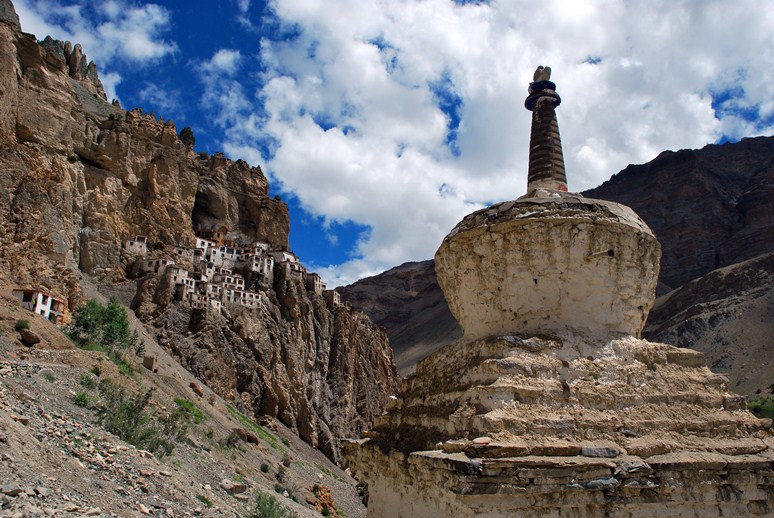
A few tents were pitched in a lower area that also had a
guesthouse and a small cafe run by the monks to generate some hard
currency. We passed by and hiked up the steep tread into the
monastery complex itself. Several monks came by to chat and see what
we were all about. One old monk came over to examine our hiking poles
and seemed rather impressed that mine could collapse in on themselves
for easy storage and to adjust for the height of the walker. This, it
seemed, was a rather impressive characteristic, especially in
comparison with Brian's non-telescopic poles. Young and old, the
monks came by at least for a look, though it might have been that we
were sitting on a perch along a popular walk way. A bell rang. We
were next to the kitchen.
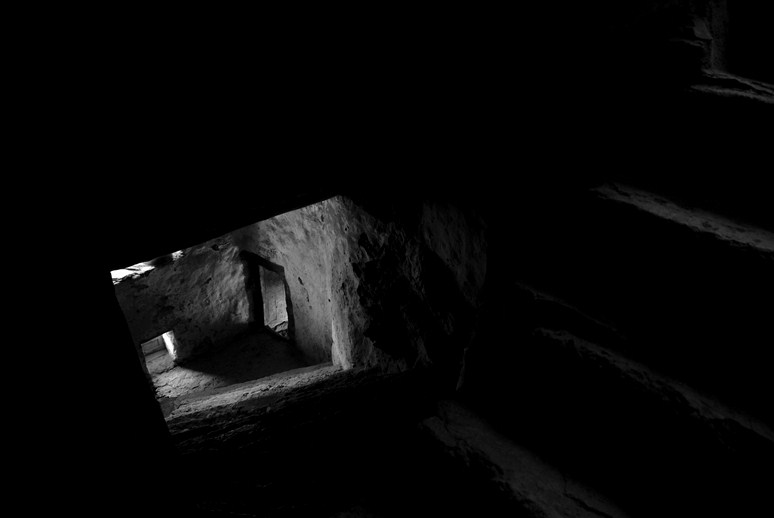
We spent the better part of two hours at the monastery and
then headed back to Purne and the guesthouse for the rest of our zero
day. I felt especially fine on the walk back and celebrated the fact
with a beer at the guesthouse, which prompted a mid afternoon nap.
When I emerged from the room, it was stormy and nasty out, with the
crack of thunder heard now and then. Much mud. Our Indian friends
that we last saw on the far side of the Shingo La had come into town
and were staying in their tent on the grounds of the guesthouse as
the rooms were all full. They seemed in fine spirits. The highrollers
came back and we found out their story. The main man was the central
development officer for the region, based out of Kargil, a Muslim
town in between Leh and Srinigar. He and his coworkers were here on
an inspection tour to find out what was needed in the valley. An
educated, polite, and thoroughly civilized man, he did his best to
fend off the requests, some of which were rather emphatic, from
various locals who would come over to ask for something, at times
with tears in their eyes. He had not wanted the kid last night to be
slaughtered, but the villages did it anyways, out of sense of respect
and hope, perhaps, for the bestowal of some boon. He took a dim view
of the future of the valley and wished that the villagers would move
out of the mountains and into the Indus valley, to the towns their,
where the government could provide aid to them. Having seen the towns
in the Indus I could understand why no one wanted to move their. The
official also told tales of price gouging and exploitations by, not
of, large tour groups, which he seemed to despise more than Brian or
I did, which was considerable. The large groups were run and staffed
by people from outside the area and would sweep through like a cloud
of locusts. Their animals would eat the little forage and they would
contribute nothing to the local economies Rather than pay villagers
for camping, as we did, they would offer a few rupees, or none at
all, and camp where they liked. There was little that the villagers
could do about it.
The official also had information about the road that was going in. Despite the presence of the military (who seemed to be doing the building, or at least the supervising), the official said that the road was a civil affair and meant to satisfy the needs of the local population. In winter, you see, the villagers are completely cut off from the outside world and need to be able to come and go much easier than they have for the last 800 years. I didn't bother to bring up the problem of snow removal and avalanche mitigation, neither of which would be done. Nor of the shoddy construction of the road or lack of engineering that was going on. The official seemed genuinely concerned for the welfare of the people in the mountains, but the approach to development in the area sounded much like the American government's approach to “developing” the American Indian by herding them on to reservations. It certainly didn't work for us.
The night wore on and we spent most of it talking with Rigzen and her sister and father, who was the owner of the guesthouse. We seemed to have made a favorable impression on everyone, especially in distinction to the Exodus group, who seemed more intent on getting hot water for baths than on finding out who they were staying with. We have another two or three days to Padum and our own showers and a resupply. Unless the remaining stretch completely lays me out, I am continuing on our trans-Zanskar trek to Lamayuru and, eventually, Leh, that shithole. I miss Shauna all the more today as this is her birthday. I'm very glad that I'm her now, as I do not think the area has an especially promising future given the trash problems, the behavior of the large tour groups, and the coming road. The time to see it was a decade or more ago. The thunder and the rain continued.
The rain pounded down all night long and it was misty and muddy in Purne. Our Indian friends were under the front porch of the kitchen, quite wet and tired from a night spent in a leaky tent. We took a relaxed approach to the morning and drank three large pots of milk tea while waiting for the skies to clear, which they eventually did. We, and the locals, were a bit concerned about the condition of the trails given the large amount of rainfall that the area had seen in the past few days. A desert land does not react well to hour upon hour of heavy rain. We eventually settled our bill with Rigzen. For two days of lodging, food, beer, soda, a few gallons of milk tea, and two pairs of socks that she made, our bill came to 2604 rupees, which we thought quite the bargain. Rather than extract 400 rupees for two people to camp for two nights, the people at Purne had gone toward the Nepalese approach: Do a bit more and get a lot more in return. We paid more, but got a lot more and it was cheap in comparison to any other place.
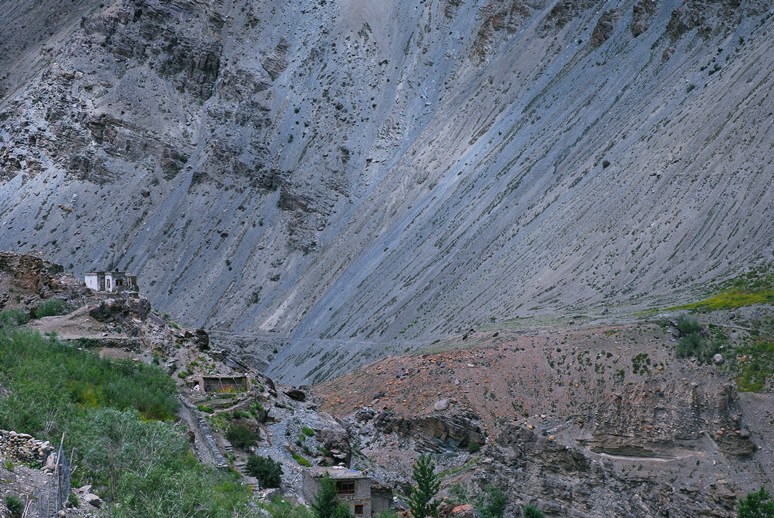
The walk out from Purne was quite dreary: Follow the
gorge, plunge down and the climb steeply up from time to time. Stare
at the brown. Repeat. The river was swollen and moving swiftly and I
found myself wishing I was elsewhere for most of the hike. The
browning out of the land didn't help, nor did my lack of lung
capacity. My energy was low and moving was hard. The river was
running high enough that at one point we had to hike in the river
itself for a hundred foot stretch, as the river had overflowed its
banks and come up to the level of the trail. This didn't bode well.
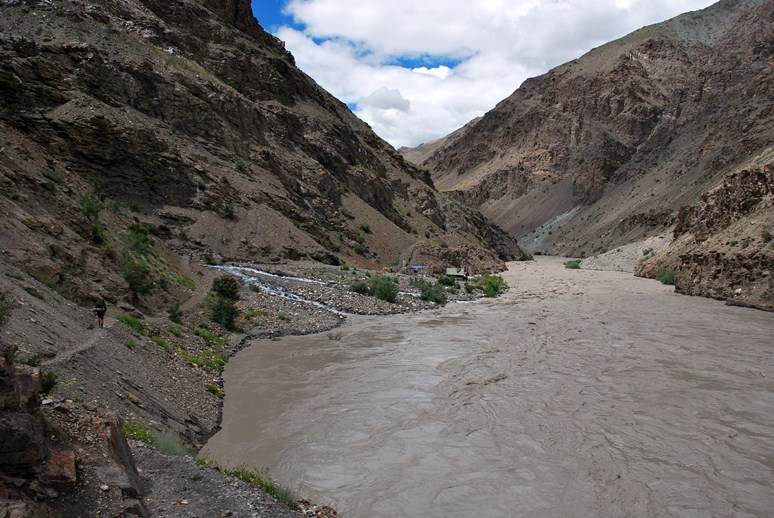
We had been planning to stop at the hamlet of Pepul,
but when we arrived we found nothing but a toilet paper strewn
rubbish heap, with a sort of building selling the usual things.
Selling, that is, if there was any one there. Three Germans had set
up tents and were apparently heading upstream. We rested for a few
minutes and then headed down to Dorzong,
which had to be a more pleasant place to spend the night. Then again,
an outhouse on the Appalachian Trail would be cleaner. Dorzong was
only a forty minute or so hike down the canyon and we found a
friendly bridge caretaker there, who collected the usual 100 Rs per
tent per night fee and then promptly crossed the bridge and went
home. The water on the other side of the bridge had come up well
above the level of the trail, forcing him into a difficult rock hop
to get to the other side with dry feet. A pleasant, piped stream came
down to the campsite, completing the polar opposite picture from
Pepul. Of course, there was no opportunity to buy a Coke or beer
here, but it was a fair enough trade.
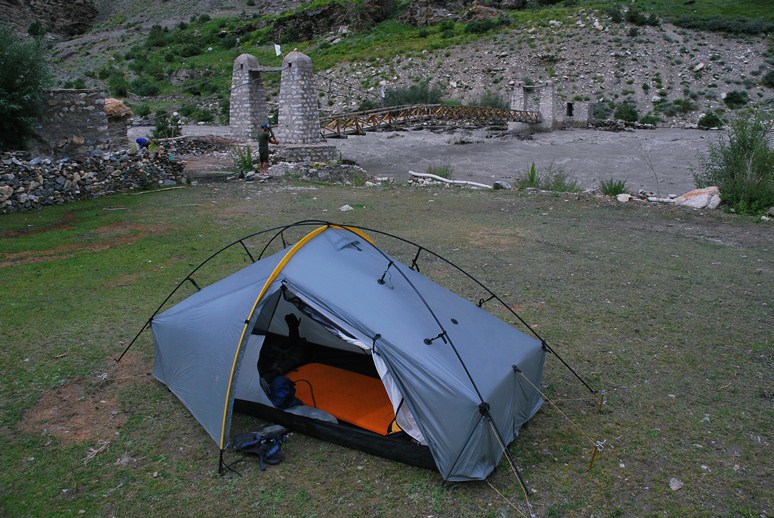
Stove issues plagued dinner, forcing me into a 45 minute
repair and cleaning session, which I managed with only a few minor
outbreaks of complete rage, frustration, and feelings of seething
hatred towards whoever invented kerosene. The stove fired eventually
and we were able to choke down our lentils, rice, and soya chunk,
though we didn't have much time to enjoy a post dinner lounging
session as the rain soon came, driving us into our tents for the
night.
I awoke with a start at the lightning and the crash of thunder, though that wasn't why I was sitting up. The tent had been flashed repeatedly and the rain was hard, but that wasn't it. It was a voice. It came again. And again. I couldn't understand what it said. It was a man's voice, and the man was clearly in some distress. He spoke little English, but he kept saying river. River. River. We were high enough above the level of the river to be safe from flooding, so it seemed that the water had come up enough to make getting to the other side too difficult. We tried to communicate for a bit, but there wasn't much I could do for him. My tent was only large enough for one and there was shelter at the bridge house, or another thirty minutes down the road at Ichar. He eventually left and I went back to sleep, listening to the rain beating on the tent fly.
The rain continued heavily during the morning, forcing a delay on us for our short day. We were not exactly sure how short it would be, since we had no idea where we would spend the night, whether in the upcoming hamlet of Reru, or in Padum, or in some in between settlement. The road had extended well up the valley and we were almost immediately walking on crushed rock. Many Indians from the central and northern parts of the country, along with plenty of Nepalese, lined the road, fitting bits of rock into the road bed by hand, using a chisel and hammer as their only tools. It was not pleasant work, especially for a road that could never function reliably. The engineers here still had not figured out water control.
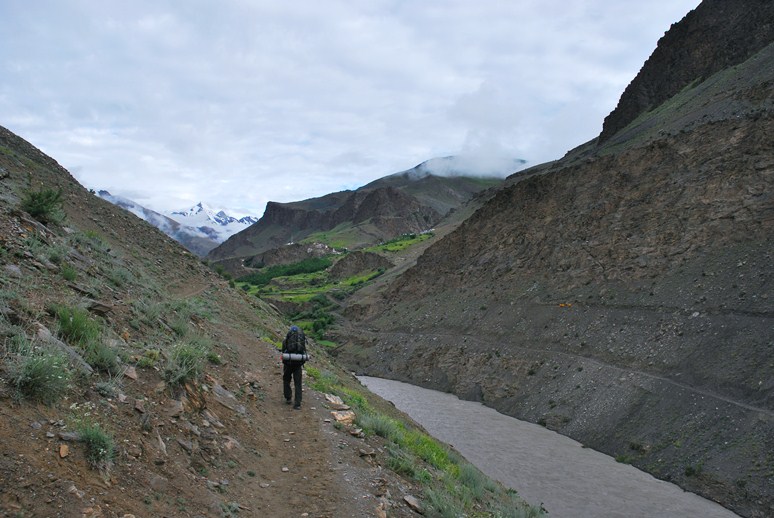
Within two hours we began to pass many camps and workers,
though no tourists, which seemed surprising to us given the quantity
we had been used to seeing on a daily basis. We reached Reru after
another hour and wandered through its deserted streets, which looked
more like a site for Pakistani target practice with mountain guns
than a working village. Walls were knocked over and things seemed
boarded up and closed. We eventually found a store that was open and
bought some sodas from a friendly older woman. Pantomiming with her
son, we learned that the road itself was closed, which we found
somewhat strange given that we had met people two days ago who had
been driven here. We sat for a while by the side of the road and
pondered what to do. There wasn't much pondering to do. We could
either stay in Reru or walk out. We chose, of course, to hoof it.
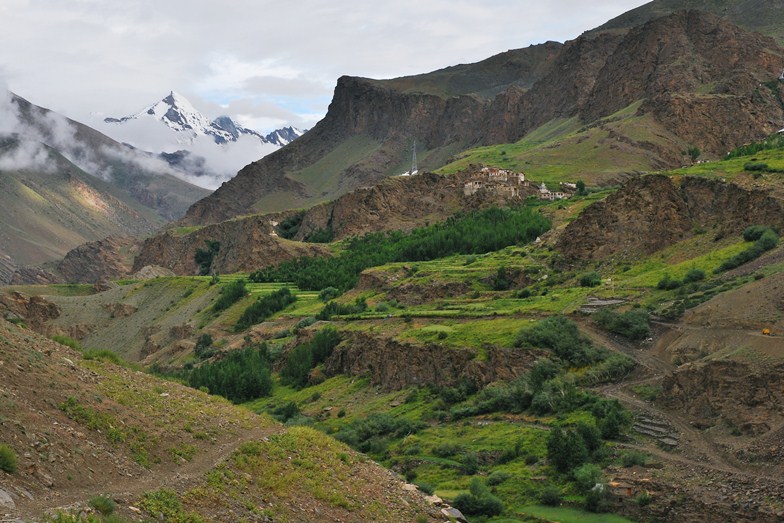
We hiked out under overcast skies. Road walking, for me,
is always fun for about the first forty minutes, then it becomes
hellish. I've had 60 mile road walks before, so I've had a lot of
experience at it. We barely got the first 40. We linked up with a
Ladakhi and, eventually, a monk, for part of the walk, which helped
to pass the time. Near the town of Mune,
we crossed a smokey hell of a paving operation. The paving was being
done the old fashioned way: As painfully as possible for the workers.
Fires were lit by the sides of the road and open drums of tar were
set over them to heat. Workers, in the swirling gas clouds, would use
mops (yes, mops), to try to push the molten stuff around on the road.
It looked like in a few places the drums were just kicked over and
then the mops applied. Nothing, of course, would be remotely level
and the tarring would break apart in a couple of years after the
freeze-thaw cycle had a chance to work on it. The suffering of the
workers would go for naught.
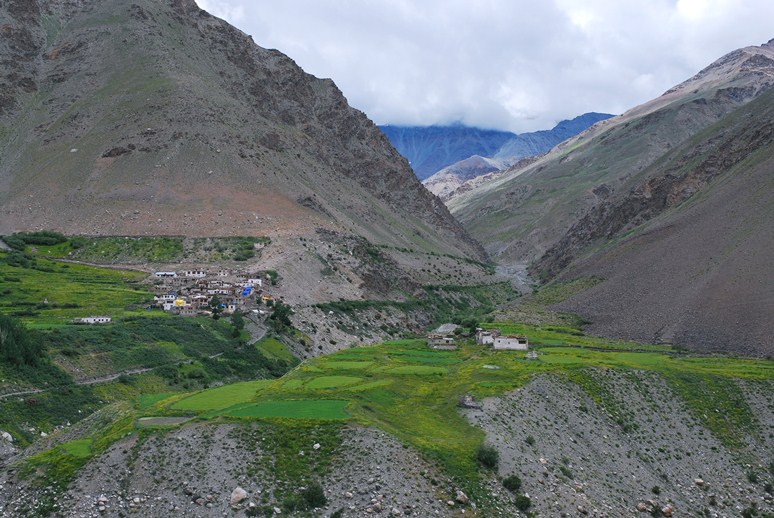
The road became long. The sun came out and began to pound
us. No vehicles, no traffic. We hiked and hiked on the the rotten
road, paved at times and unpaved at others. Our feet began to sing
loudly in that chorus of pain that roadwalkers know only too well. An
hour, two hours, five hours. Finally a massive Tata came
barreling down the road, driven by two men in Indian army uniforms
and hauling a troop of workers for the road. They stopped and let us
hop into the back with the workers for the remaining mile or two to
their job site. We didn't get quite there, as a Tata
jeep had gotten stuck in a river
crossing where a creek had (surprise, surprise) washed out the road .
We kept moving. An hour later another Tata came
down from the mountains and stopped for us. It was the best car ride
I'd been in since the last time someone picked me up on a roadwalk.
The truck was driven by a young-ish man who evidently was a sort of taxi driver in the area, ferrying tourists to trailheads and returning with whomever he could pick up along the way. Padum was only five or six kilometers further down the road, but we were so beat that it would have taken us another two hours to reach town. Although the town seemed fairly charmless, it was much less obnoxious than Leh and we heard a rumor of a bar in town.
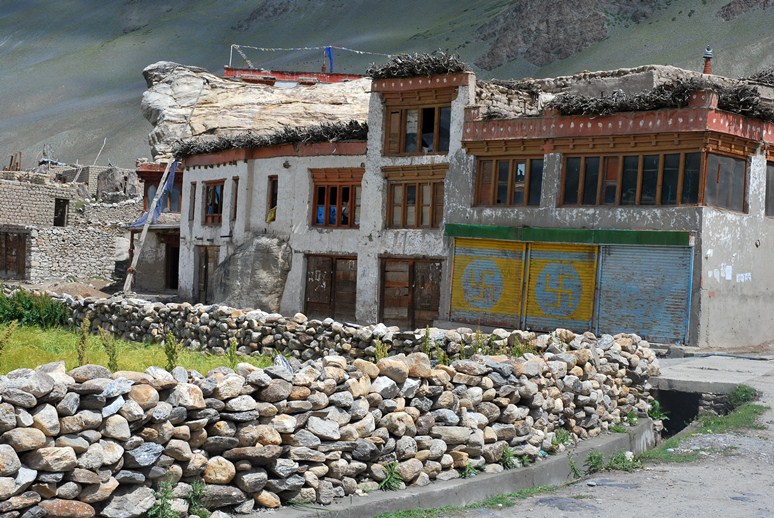
Our ride dropped us off at the main taxi stand and we quickly
found our way to the Mount Blanc guesthouse, which our guidebook said
was run by an ex-pat Frenchmen. 450 rupees a night got us a swank two
bed room with bathroom. The Zanskari owners seemed very nice. Once in
town our stomachs overcame the weariness of the road and we set out
for a feast. The Lhasa Restaurant was
the perfect joint for us: Uninhabited by any palefaces and run by
people who spoke no English. Thentuk, a
brothy soup of vegetables and doughy dumplings, along with a big
plate of momos disappeared
in a rapid hurry. We couldn't completely gorge ourselves as we had
arranged for dinner at the guesthouse in another two hours. I went in
search of beer and found none. The town itself seemed like every
other town down in the valley. Not much charm, pretty industrial, and
filled with litter and vehicles.
There was an archery tournament
going on for the youths of the Zanskar region, but this was much less
interesting than it seemed. I watched a bit of it and found my
obvious cultural bias to come out rather strongly. The archers used
what looked like home made bows and shot at targets located
approximately 50 feet from them. Using every a 30 year old bow in the
States, any rube should be able to hit a pie plate at that distance.
But the homemade bows launched projectiles that arched through the
air and fell well away from the three foot diameter target. I watched
for ten minutes and didn't see a single hit, though the competitors
were having a riotously good time, which seemed to be the point.
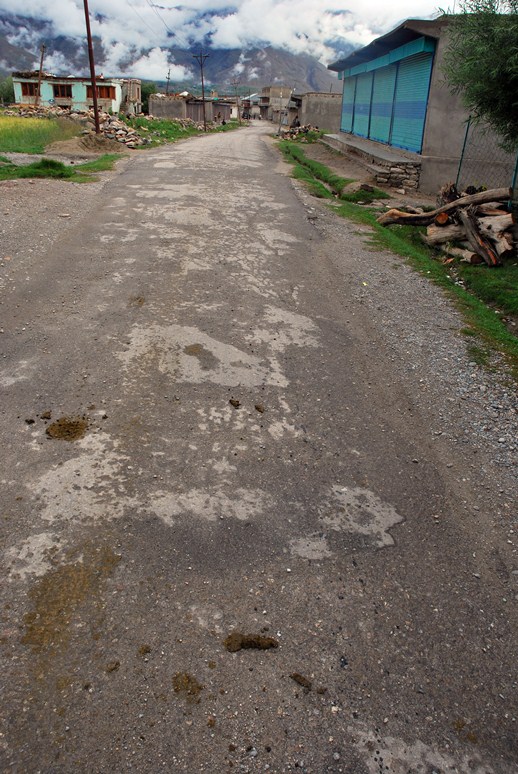
The late afternoon faded into early evening, finding Brian and I in our rooms watching clothes dry and reveling in our non-stink. Although the shower was just a bucket of room temperature water, it felt good not to be greasy. We joined the multigenerational family for dinner, with Grandpa pouring me tall glasses of distilled rice wine named arak, which is the name for a similar drink in places like Nepal and all the way over in Syria. Dinner itself was delicious, with a tomato based curry with boiled eggs, spinach cooked in a sort of milk or yogurt sauce, rice, and lots of tea. But as the clock nudged toward eight, we found it harder and harder to stay awake and tell the family about our travels and listen to their tales of Israelis, Pakistanis, and living in a remote place. As I settled into the bed and pulled the scratchy blanket over the top of myself, I thought about Shauna, as I always seemed to, and the future for us. A lot was going to change in my life when I returned back to the States. And I was looking forward to every last little bit of it.